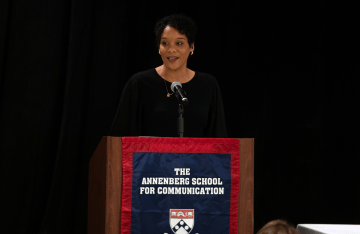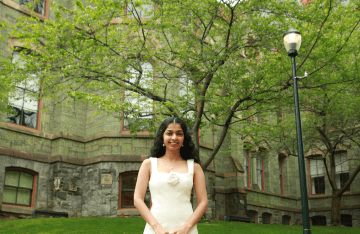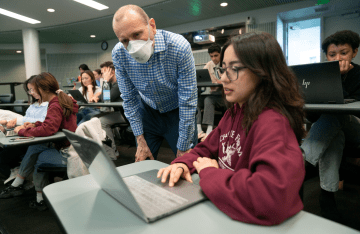Undergraduate Research Project Awarded Penn’s Shah Family Prize
Hadeel Saab (C’20) and Anna Waldzinska (C’20) are researching how to increase voter turnout.

Photo Credit: Scott Spitzer / University of Pennsylvania
As part of Professor Emily Falk’s Fall 2018 Academically Based Community Service course COMM 310: The Communication Research Experience, Communication majors Hadeel Saab (C’20) and Anna Waldzinska (C’20) partnered with Penn Leads The Vote (PLTV) to conduct research into increasing voter turnout for the U.S. midterm elections.
In March, Saab and Waldzinska, along with PLTV members Harrison Feinman (C’22) and Eva Gonzalez (C’22), were selected as inaugural recipients of the Shah Family Prize for Innovative Undergraduate Student Projects from the Netter Center for Community Partnerships at the University of Pennsylvania.
“The Shah Family Prize will allow these awesome students to continue promoting evidence-based tactics for encouraging democratic engagement at Penn and in West Philly,” says Falk, who will supervise the students as they conduct follow-up research.
The Shah Family Prize enables highly motivated and dedicated Penn undergraduates to further develop, improve, and successfully implement creative civic and community engagement projects. Designed to encourage social innovation and to have sustained positive impacts both on campus and in the local community, the Shah Family Prize is awarded to two outstanding projects each year.

Saab and Waldzinska’s project was described by the selection committee as “outstanding,” “terrific,” “impressive,” and certain “to have strong impacts.”
Consisting of $5,000, the Shah Family Prize will allow the students to continue analyzing the data they collected from their fall 2018 voter engagement experiment and identify strengths and weaknesses of their approach, as well as advance academic partnerships that will help increase voter engagement at Penn and in the community. They also plan to explore ways to improve their data collection and evaluate strategies that are specifically effective for young people to advance civic engagement.
“Through this additional research, we’ll get a better grasp of the many factors that affected our data and be able to optimize our strategies for increasing the Penn community’s voter turnout,” says Saab. “Increasing voter engagement on a college campus is a difficult task, but with this prize and the partnerships and resources that come with it, we’re hopeful!”



